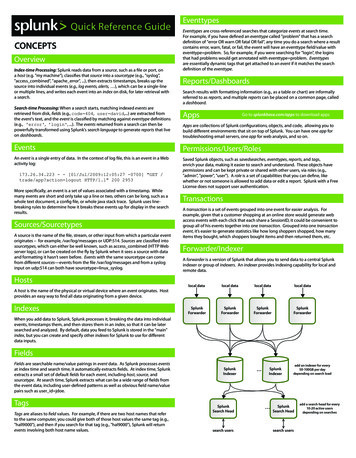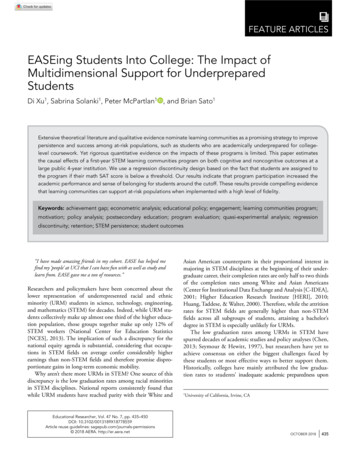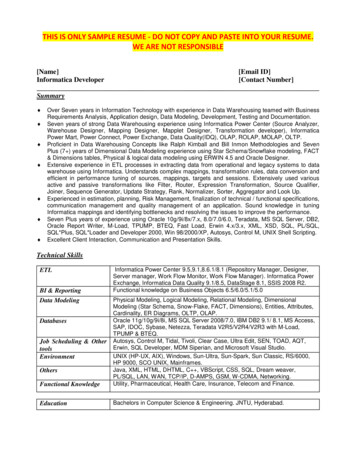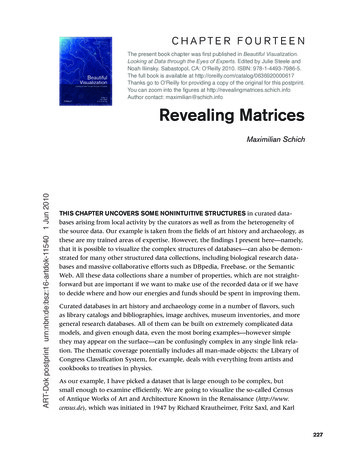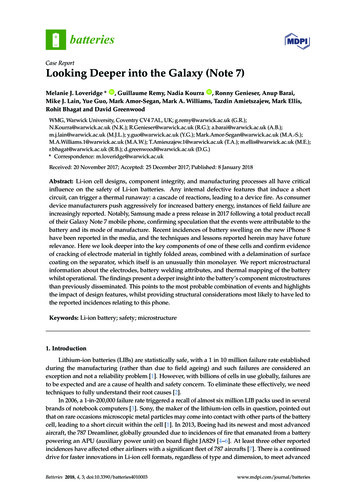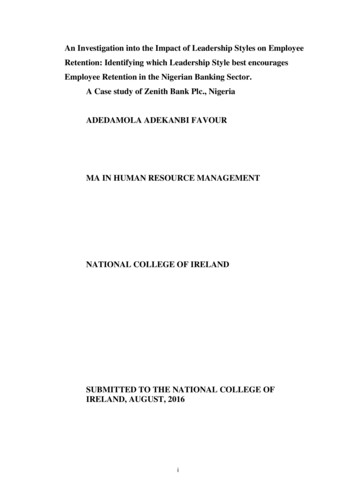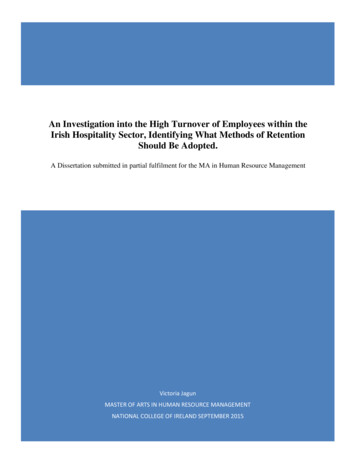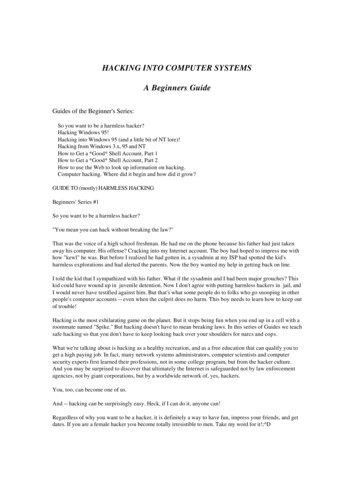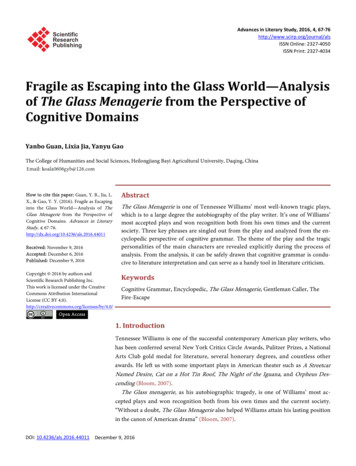
Transcription
Advances in Literary Study, 2016, 4, 67-76http://www.scirp.org/journal/alsISSN Online: 2327-4050ISSN Print: 2327-4034Fragile as Escaping into the Glass World—Analysisof The Glass Menagerie from the Perspective ofCognitive DomainsYanbo Guan, Lixia Jia, Yanyu GaoThe College of Humanities and Social Sciences, Heilongjiang Bayi Agricultural University, Daqing, ChinaHow to cite this paper: Guan, Y. B., Jia, L.X., & Gao, Y. Y. (2016). Fragile as Escapinginto the Glass World—Analysis of TheGlass Menagerie from the Perspective ofCognitive Domains. Advances in LiteraryStudy, 4, ived: November 9, 2016Accepted: December 6, 2016Published: December 9, 2016Copyright 2016 by authors andScientific Research Publishing Inc.This work is licensed under the CreativeCommons Attribution InternationalLicense (CC BY stractThe Glass Menagerie is one of Tennessee Williams’ most well-known tragic plays,which is to a large degree the autobiography of the play writer. It’s one of Williams’most accepted plays and won recognition both from his own times and the currentsociety. Three key phrases are singled out from the play and analyzed from the encyclopedic perspective of cognitive grammar. The theme of the play and the tragicpersonalities of the main characters are revealed explicitly during the process ofanalysis. From the analysis, it can be safely drawn that cognitive grammar is conducive to literature interpretation and can serve as a handy tool in literature criticism.KeywordsCognitive Grammar, Encyclopedic, The Glass Menagerie, Gentleman Caller, TheFire-EscapeOpen Access1. IntroductionTennessee Williams is one of the successful contemporary American play writers, whohas been conferred several New York Critics Circle Awards, Pulitzer Prizes, a NationalArts Club gold medal for literature, several honorary degrees, and countless otherawards. He left us with some important plays in American theater such as A StreetcarNamed Desire, Cat on a Hot Tin Roof, The Night of the Iguana, and Orpheus Descending (Bloom, 2007).The Glass menagerie, as his autobiographic tragedy, is one of Williams’ most accepted plays and won recognition both from his own times and the current society.“Without a doubt, The Glass Menagerie also helped Williams attain his lasting positionin the canon of American drama” (Bloom, 2007).DOI: 10.4236/als.2016.44011December 9, 2016
Y. B. Guan et al.The play was set in St. Luis United States in the 1930s—the Depression period. Thereare seven scenes and only four main characters: Amanda, Laura, Tom and Jim O’Connor.It is about the tragic story of a three-member family. Because the father—Mr. Wingfield—left home long ago and his picture with big smile is the only thing that remindsthe audience of him in the family. Amanda, the mother, being deserted by her husband,lives in the memory when she was young and popular among the gentlemen. Because ofher physical disability, Laura the daughter is lost in her own world with glass animals.And Tom the son working in a shoe factory, inherits his father’s longing for farawayplaces. Hungering for the big changes in life and the country, he is caught in an awkward dilemma between supporting the family and leaving home to pursue his dream(Williams, 2000).The play falls into two parts: the preparation for the gentleman callers and the visit ofa gentleman. Though, sometimes Amanda’s behavior is out of accord with times andlooks absurd, she’s a good and responsible mother anyway. Because Laura, the daughter, is crippled physically and consequently mentally, she has great difficulty in communicating with strangers, let alone merging herself into them. Unable to change herdaughter no matter how hard she tries, Amanda has to find other ways to guarantee asecure future for her daughter: to find a husband for her. Thus she is obsessed with theidea of inviting a gentleman home, who would fall in love with Laura. She urged herson to invite his colleagues home by promising him that he could leave home as soon asLaura is taken over by a gentleman. But when Tom does bring one home, it winds updisastrously for Laura. Later, Tom finally makes his decision and leaves home, following in his father’s footsteps and deserting Amanda and Laura. He’s tortured by his conscience though (Williams, 2000). Owing to the auto-biographic nature of the play, strongemotion can be easily caught from word to word.2. The Theoretical FrameworkAccording to Cognitive Grammar, meaning is conceptualization which resides in thecombination of conceptual content and conceptual construal. The latter refers to ourability to conceive the same situation in alternate ways. Thus to a degree, meaning issubjective. Based on the conceptual content, different construal will lead to totally different meaning. And language meaning is embodied, built on our interaction with andin the world. And it’s through constant encounters with the usage events that languageunits get entrenched in our mind. It’s not something that comes from thin air. Theentrenched unit can work as the categorizing unit to sanction the new usage event.Thus meaning is dynamic and encyclopedic, presupposing rich background knowledge(Langacker, 1987, 1999, 2008, 2009; Taylor, 2002). Language is but the tip of a meaningmaking iceberg (Evans, 2015; Fauconnier & Turner, 2002). The expression provides anaccess to a series of cognitive domains, which refers to the background knowledge concerning the world underlying the expression. Some domains are irreducible, hence basic (the experiential potential such as space, time, color, pitch, temperature and so on),and most being non-basic (simple or complex). The set of cognitive domains of an ex68
Y. B. Guan et al.pression form a conceptual matrix, ranking in their centrality. The central ones are activated on most occasions, while peripheral ones usually remain dormant. The latter,however, can override the central in special contexts (Langacker, 1987, 1999, 2008,2009; Taylor, 2002). And there is no lacking in examples. For example, when mentioning the word “banana”, we’ll naturally think of its color, its yellow skin, its shape, itstaste, and the fact that it’s growing in the tropical areas, which are all central for a banana to be a banana. Sometimes, however, when we go to the grocery, the price of thebanana will come to the fore, which is usually not considered essential to the meaningof banana. And while we speak of “the banana republic”, the economy and politics ofthe countries concerned will outweigh the central domains mentioned above and servethe central role in understanding the phrase. From the analysis, it’s clear that when twosimple structures are put together to form a complex one, its meaning is not the simpleaddition of the simple structures, there is more to it. Just as the phrase “banana republic” does not simply refer to the country that produce bananas. “Weak economy” and“dishonest or cruel government” is connoted in it, both of which could obtain neitherin “banana” nor “public”. To illustrate the idea more clearly, look at the following examples:(1) The first thing we do, let’s kill all the lawyers.(2) She dresses to kill.(3) That joke killed me.(4) Let’s do something to kill time.(5) They killed a bottle of brandy (Evans, 2015).In all these examples, there is a vestige of the meaning “causing to die” in every usageof the word “kill”. But only (1) holds the original meaning “to cause somebody to die”,but we definitely would not understand the other four sentences in the same way. (2)emphasizes the attractiveness of a lady which would take one’s breath away, (3) stressing fact that joke made me laugh a lot, (4) referring to the time spent and (5) the drinkconsumed.From the examples, it’s clear that the meaning of a word is not in any way predetermined and the context plays a critical role in determining the meaning of a given word, which will help access different cognitive domain or domains. “ this reveals that meaning is not to be an all-or-nothing affair” (Evans, 2015) In addition, themeaning of the expression is to a large degree determined by the context it occurs in,either the subject (as in (3)), or the objects (as in (1), (4), (5)). So it can be inferredthat the composed structures which is obtained by combining two or more words isnot the simple addition of its components parts. As in the above examples, the meanings of all the phrases with “kill” have something unique which couldn’t just be predicted from the component parts. Such a phenomenon is very common in all languages, instead of being unique to English, as can be shown in the following Chineseexamples.(6) a. 冬天到了,能穿多少穿多少。(Winter has arrived, and we should put on as many clothes as we can.)69
Y. B. Guan et al.b. 夏天到了,能穿多少穿多少。(Summer has arrived, and we should put on as few clothes as we can.)(7) 一女孩儿与他男朋友打电话:(A girls talks through the telephone with her boyfriend:)a. �我没到,你等着。”(We’ll meet at the Xianhemen subway station at half past one. If you arrive and Idon’t, wait for me.)b. �你没到,你等着。”(We’ll meet at the Xianhemen subway station at half past one. If I arrive and youdon’t, wait and see.)For any native Chinese speakers, they can easily differentiate the meanings of the twosentences in (6) and (7), in (6)a, because winter is the time for the action of “putting onclothes”, what’s emphasized is 多 (many), while the meaning of other component 少(a few) contributes little to the composed structure. In (6)b, because summer is the timefor the action, it stresses 少 (few), 多 (with the meaning close to “so” in this sentence) being the degree adverb. In 7, the same sentence can be interpreted in two totallydifferent ways, just because the context is different. And for the examples in (7), justby swapping the positions of the pronouns “you” and “I”, the sentence “你等着” takeson totally different meanings: in (7)a, it’s a imperative sentence to let her boyfriend waitfor her, while in (7)b, it’s a threat to warn her boyfriend of the consequence of beinglate for the date. And no Chinese adult will fail to distinguish the difference in the twosentences.From the examples, it can be easily seen that the meaning of more elaborate expressions (composed structures in the following part of the article) which is formed bycombining the simple expressions (component structures in the following part of thearticle) is not the simple addition of the latter. The component structures only activateand motivate the composed structures, the meaning of which is heavily influenced byother factors such as context and specific usage events (Langacker, 1987, 1999, 2008,2009; Taylor, 2002).The article is designed to make use of the encyclopedic and dynamic nature ofmeaning to explore some key phrases in the play The Glass Menagerie and to analyzethe theme and the tragic personality of the characters of the work.3. Analysis from the Perspective of Encyclopedic SemanticsThere are many things underlying a word, thus to understand the word properly, it’snecessary to have the concerning background knowledge. And to understand the phraseformed by composing two or more words together, the situation would be more complex. Not only do the cognitive domains of the single word need to be considered, thecomposing path—the way the words are put together—also means a lot. The result isthat there are always new meanings springing up from the composed structure which isunique to it and does not derive from any of the component structure. Three keyphrases in the play are singled out from the play—The Glass Menagerie to be analyzed70
Y. B. Guan et al.from this perspective below.3.1. The Glass MenagerieThe most salient and important phrase in the play is the title The Glass Menagerie.Mentioning glass, we can think of its function (it’s used to make containers, windows,and ornaments, etc.), its nature (it’s something transparent, something that’s glitteringand something that breaks easily), and its making material (it’s something that’s madeof silicon) etc. As the central domain of the word, we always associate glass with products which are made of glass: the windows, the drinking container, and the beautifulornaments, you name it. But what never fails to come to people’s mind first is its nature: that it’s fragile and easily broken and needs delicate care. No matter what kind ofglass product it is, the container of which is usually marked “handle with care”.The word “menagerie” invokes to mind the animals kept in cage, the number ofwhich should not be small, otherwise it would not be a menagerie. Thus it follows thatthe state of confinement and lack of freedom and the relationship between the animalswill also be invoked to our mind. Glass menagerie is a composition of the components“glass” and “menagerie”, so it inherits the features both from the word “glass” and theword “menagerie”. On the one hand the fragile and venerable nature of the ornamentsis definitely the legacy of the word “glass”. On the other hand, menagerie refers to thecollection of things, thus the relationship is hinted in it. Thus in “The Glass Menage-rie”, it’s not only the glass ornaments that need good care, but the relationship betweenthe animals wants careful maintenance, otherwise it won’t be a menagerie any more.From the analysis of the title, it can be safely inferred that the relationship betweenthe three members of the family is as fragile as the characters themselves, and that ifhandled crudely, the relationship among them is as prone to be damaged as they themselves to be hurt. Just as Laura says in Scene Seven “My glass collection takes up a gooddeal of time. Glass is something you have to take good care of.” Thus “a great deal oftime” means that lots of attention and energy is called for to maintain the good state ofthe glass collection. Moreover, one needs to be carful. To the three-member family,
The Glass menagerie, as his autobiographic tragedy, is one of Williams’ most ac-cepted plays and won recognition both from his own times and the current society. “Without a doubt, The Glass Menagerie also helped Williams attain his lasting position in the canon of American drama” (Bloom, 2007). How to cite this paper: Guan, Y. B., Jia, L.
